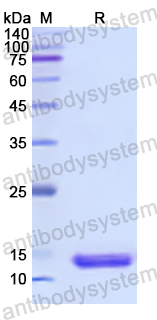Catalog No.
YHF25201
Expression system
E. coli
Species
Homo sapiens (Human)
Protein length
Thr237-Ser350
Predicted molecular weight
14.78 kDa
Nature
Recombinant
Endotoxin level
Please contact with the lab for this information.
Purity
>90% as determined by SDS-PAGE.
Accession
P58166
Applications
ELISA, Immunogen, SDS-PAGE, WB, Bioactivity testing in progress
Form
Lyophilized
Storage buffer
Lyophilized from a solution in PBS pH 7.4, 0.02% NLS, 1mM EDTA, 4% Trehalose, 1% Mannitol.
Reconstitution
Reconstitute in sterile water for a stock solution. A copy of datasheet will be provided with the products, please refer to it for details.
Shipping
In general, proteins are provided as lyophilized powder/frozen liquid. They are shipped out with dry ice/blue ice unless customers require otherwise.
Stability and Storage
Use a manual defrost freezer and avoid repeated freeze thaw cycles. Store at 2 to 8°C for frequent use. Store at -20 to -80°C for twelve months from the date of receipt.
Alternative Names
Activin beta-E chain, Inhibin beta E chain, INHBE
Transforming Properties of E6/E7 Oncogenes from Beta-2 HPV80 in Primary Human Fibroblasts., PMID:40508156
Dietary Insulinogenic Amino Acid Restriction Improves Glucose Metabolism in a Neonatal Piglet Model., PMID:40431415
An Arrayed CRISPR Screen Identifies Knockout Combinations Improving Antibody Productivity in HEK293 Cells., PMID:40014422
Activin E is a new guardian protecting against hepatic steatosis via inhibiting lipolysis in white adipose tissue., PMID:39948368
Rare variant associations with birth weight identify genes involved in adipose tissue regulation, placental function and insulin-like growth factor signalling., PMID:39809772
Mechanistic insights into Y-Box binding protein-1 mediated regulation of lipid metabolism and oxidative stress in NAFLD via INHBE/TNF-β pathway., PMID:39748602
Activin E upregulates uncoupling protein 1 and fibroblast growth factor 21 in brown adipocytes., PMID:38972346
Hepatic Activin E mediates liver-adipose inter-organ communication, suppressing adipose lipolysis in response to elevated serum fatty acids., PMID:38787338
Rare variant associations with birth weight identify genes involved in adipose tissue regulation, placental function and insulin-like growth factor signalling., PMID:38633783
Identification and validation of INHBE and P4HA1 as hub genes in non-alcoholic fatty liver disease., PMID:37922570
Activin E-ACVR1C cross talk controls energy storage via suppression of adipose lipolysis in mice., PMID:37523551
Alterations in gene expressions of Caco-2 cell responses to LPS and ploy(I:C) stimulation., PMID:37304876
Analysis of signaling cascades from myeloma cells treated with pristimerin., PMID:36858733
Immune-related gene-based prognostic index for predicting survival and immunotherapy outcomes in colorectal carcinoma., PMID:36591255
Knockout of Trpa1 accelerates age-related cardiac fibrosis and dysfunction., PMID:36103570
Multiancestry exome sequencing reveals INHBE mutations associated with favorable fat distribution and protection from diabetes., PMID:35999217
CHST7 Methylation Status Related to the Proliferation and Differentiation of Pituitary Adenomas., PMID:35954244
Rare loss of function variants in the hepatokine gene INHBE protect from abdominal obesity., PMID:35896531
The Significance of INHBE Expression in the Cancer Cells of Clear-Cell Renal Cell Carcinoma., PMID:34515260
Construction of a prognostic value model in papillary renal cell carcinoma by immune-related genes., PMID:33761648
Exploration of immune-related genes in high and low tumor mutation burden groups of chromophobe renal cell carcinoma., PMID:32662515
Alveolar soft-part sarcoma (ASPS) resembles a mesenchymal stromal progenitor: evidence from meta-analysis of transcriptomic data., PMID:32596059
Effect of a monocyte chemoattractant protein-1 synthesis inhibitor on fibroblasts from patients with carpal tunnel syndrome., PMID:32317146
Regulation of hepatokine gene expression in response to fasting and feeding: Influence of PPAR-α and insulin-dependent signalling in hepatocytes., PMID:31163275
Activin E enhances insulin sensitivity and thermogenesis by activating brown/beige adipocytes., PMID:30880304
Identification and expression of the medaka inhibin βE subunit., PMID:30680594
Role of AGAP2 in the profibrogenic effects induced by TGFβ in LX-2 hepatic stellate cells., PMID:30660615
Activin E Controls Energy Homeostasis in Both Brown and White Adipose Tissues as a Hepatokine., PMID:30380411
Inhibin βE (INHBE) is a possible insulin resistance-associated hepatokine identified by comprehensive gene expression analysis in human liver biopsy samples., PMID:29596463
Argininosuccinate synthase 1 and periportal gene expression in sonic hedgehog hepatocellular adenomas., PMID:29572896
Molecular Classification of Hepatocellular Adenoma Associates With Risk Factors, Bleeding, and Malignant Transformation., PMID:27939373
Refeeding with glucose rather than fructose elicits greater hepatic inflammatory gene expression in mice., PMID:25837224
Protein deep sequencing applied to biobank samples from patients with pancreatic cancer., PMID:25216700
Effects of recombinant activins on steroidogenesis in human granulosa-lutein cells., PMID:25062451
Identification of FHL2-regulated genes in liver by microarray and bioinformatics analysis., PMID:24453047
Tetracyclines cause cell stress-dependent ATF4 activation and mTOR inhibition., PMID:24280420
Genome-wide association study for inhibin, luteinizing hormone, insulin-like growth factor 1, testicular size and semen traits in bovine species., PMID:23785023
The inhibin-βC subunit is down-regulated, while inhibin-βE is up-regulated by interferon-β1a in Ishikawa carcinoma cell line., PMID:23580013
The regulation of gene expression involved in TGF-β signaling by ZNF804A, a risk gene for schizophrenia., PMID:23434502
Inhibin beta E is upregulated by drug-induced endoplasmic reticulum stress as a transcriptional target gene of ATF4., PMID:22935518
Inhibin/activin betaE-subunit in uterine endometrioid adenocarcinoma and endometrial cancer cell lines: from immunohistochemistry to clinical testing?, PMID:21507472
Evidence of inhibin/activin subunit betaC and betaE synthesis in normal human endometrial tissue., PMID:21092084
NVP-BEZ235, a dual pan class I PI3 kinase and mTOR inhibitor, promotes osteogenic differentiation in human mesenchymal stromal cells., PMID:20499346
Gene expression and genetic variation in response to endoplasmic reticulum stress in human cells., PMID:20398888
Inhibin/activin-betaE subunit is expressed in normal and pathological human placental tissue including chorionic carcinoma cell lines., PMID:20052482
Inhibin/activin-betaE subunit in normal and malignant human cervical tissue and cervical cancer cell lines., PMID:20033758
Inhibin/activin-betaC and -betaE subunits in the Ishikawa human endometrial adenocarcinoma cell line., PMID:20012305
Implication of activin E in glucose metabolism: transcriptional regulation of the inhibin/activin betaE subunit gene in the liver., PMID:19703474
Hedgehog signaling, epithelial-to-mesenchymal transition and miRNA (review)., PMID:18698484
Genetic variation in the inhibin pathway and risk of testicular germ cell tumors., PMID:18413775

